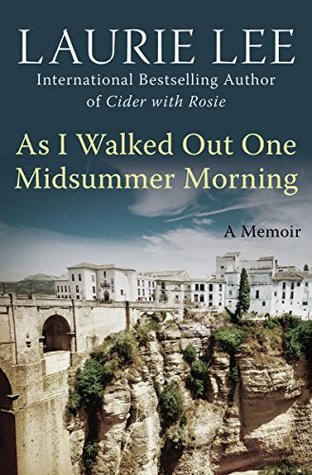More on this book
Community
Kindle Notes & Highlights
by
Laurie Lee
Read between
July 1 - August 8, 2017
For the first time I was learning how much easier it was to leave than to stay behind and love.
Gulping the fine dry air and sniffing the pitch-pine mountain, I was perhaps never so alive and so alone again.
Most other capitals, in such heat, would still have been an inferno of duty, full of damp shopgirls and exhausted clerks. But not here, for Madrid knew when to say No, and draw its shutters against the sun. This, of course, was also the habit in other Spanish cities; but here it had reached a peak of particular genius. For Madrid at that time, if not today, was a city of a thousand exquisite taverns – water-cooled, barrel-lined, and cavernously spacious, cheap and affectionately run, in whose traditional shade the men, at least, spent a half of their waking time.
The woman asked me in French if I was German, and I replied in Spanish that I was English.
Until now, I’d accepted this country without question, as though visiting a half-crazed family. I’d seen the fat bug-eyed rich gazing glassily from their clubs, men scrabbling for scraps in the market, dainty upper-class virgins riding to church in carriages, beggar-women giving birth in doorways. Naive and uncritical, I’d thought it part of the scene, not asking whether it was right or wrong. But it was in Seville, on the bridge, watching the river at midnight, that I got the first hint of coming trouble.
A Spanish schoolmaster at this time knew less of the outside world than many a shepherd in the days of Columbus. Now it was hoped that there might be some lifting of this intolerable darkness, some freedom to read and write and talk. Men hoped that their wives might be freed of the triple trivialities of the Church – credulity, guilt, and confession; that their sons might be craftsmen rather than serfs, their daughters citizens rather than domestic whores, and that they might hear the children in the evening coming home from fresh-built schools to astonish them with new facts of learning.
Now that Almuñécar had come out under the scarlet banner, the morning was one of mounting action. This was the day when the peasants and fishermen openly took over the village, commandeering the houses of suspects and the empty villas of the rich and painting across them their plans for a new millennium. ‘Here will be the Nursery School.’ ‘Here will be the House of Culture.’ ‘Here will be a Sanatorium for Women.’ ‘Workers, Respect this House for Agricultural Science.’ ‘Here will be a Training College for Girls’ … Each of the large bold words were painstakingly written in red, a memoranda of a
...more
Under the pale street lamps, amid the weeping and curses, the simple truth was being uncovered. After the day’s massacre at Altofaro, and the clumsy impotence of the warships – whose shells appeared to have fallen harmlessly in open country – it was being learned again that men needed more than courage, anger, slogans, convictions, or even a just cause when they went to war. The village became aware that night, not for the first time in its history, that a people’s army could be defeated.


